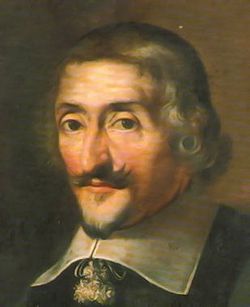
Claude Favre de Vaugelas
Encyclopedia


Claude Favre de Vaugelas (6 January 1585 – February 1650) was a French grammar
Grammar
In linguistics, grammar is the set of structural rules that govern the composition of clauses, phrases, and words in any given natural language. The term refers also to the study of such rules, and this field includes morphology, syntax, and phonology, often complemented by phonetics, semantics,...
ian and man of letters. Although a life-long courtier
Courtier
A courtier is a person who is often in attendance at the court of a king or other royal personage. Historically the court was the centre of government as well as the residence of the monarch, and social and political life were often completely mixed together...
, Claude Favre was widely known by the name of one of the landed estates
Manorialism
Manorialism, an essential element of feudal society, was the organizing principle of rural economy that originated in the villa system of the Late Roman Empire, was widely practiced in medieval western and parts of central Europe, and was slowly replaced by the advent of a money-based market...
he owned as seigneur of Vaugelas and baron
Baron
Baron is a title of nobility. The word baron comes from Old French baron, itself from Old High German and Latin baro meaning " man, warrior"; it merged with cognate Old English beorn meaning "nobleman"...
of Peroges.
Born at Meximieux
Meximieux
Meximieux is a commune in the Ain department in eastern France.-Geography:Located 35 km north east of Lyon and 10 km from Ambérieu-en-Bugey, the town is where the Dombes plateau meets the plain of the Ain River. Historically, Meximieux was part of the former province of Bresse...
, in the Ain
Ain
Ain is a department named after the Ain River on the eastern edge of France. Being part of the region Rhône-Alpes and bordered by the rivers Saône and Rhône, the department of Ain enjoys a privileged geographic situation...
département of France, he became gentleman-in-waiting
Gentleman of the Bedchamber
A Gentleman of the Bedchamber was the holder of an important office in the royal household of the Kingdom of England from the 11th century, later used also in the Kingdom of Great Britain.-Description and functions:...
to Gaston, Duke of Orléans
Gaston, Duke of Orléans
Gaston of France, , also known as Gaston d'Orléans, was the third son of King Henry IV of France and his wife Marie de Medici. As a son of the king, he was born a Fils de France. He later acquired the title Duke of Orléans, by which he was generally known during his adulthood...
, and continued faithful to this prince in his disgrace, although his fidelity cost him a pension from the crown on which he was largely dependent.
His thorough knowledge of the French language
French language
French is a Romance language spoken as a first language in France, the Romandy region in Switzerland, Wallonia and Brussels in Belgium, Monaco, the regions of Quebec and Acadia in Canada, and by various communities elsewhere. Second-language speakers of French are distributed throughout many parts...
and the correctness of his speech won him a place among the original members of the Académie française
Académie française
L'Académie française , also called the French Academy, is the pre-eminent French learned body on matters pertaining to the French language. The Académie was officially established in 1635 by Cardinal Richelieu, the chief minister to King Louis XIII. Suppressed in 1793 during the French Revolution,...
in 1634. On the representation of his colleagues his pension was restored so that he might have leisure to pursue his Remarques sur la langue française (1647). In this work he maintained that words and expressions were to be judged by the current usage of the best society, of which, as a regular of the Hotel de Rambouillet
Hôtel de Rambouillet
The Hôtel de Rambouillet was the Paris residence of Madame de Rambouillet, who ran a renowned literary salon there from about 1607 until her death in 1665...
, Vaugelas was a competent judge. He shares with François de Malherbe
François de Malherbe
François de Malherbe was a French poet, critic, and translator.-Life:Born in Le-Locheur , his family was of some position, though it seems not to have been able to establish to the satisfaction of heralds the claims which it made to nobility older than the 16th century.He was the eldest son of...
the credit of having purified French diction. His book fixed the current usage, and the classical writers of the 17th century regulated their practice by it.
Protests against the academical doctrine were not lacking. Scipion Dupleix in his Liberté de la langue française dans sa pureté (1651) pleaded for the richer and freer language of the 16th century, and François de La Mothe-Le-Vayer took a similar standpoint in his Lettres à Gabriel Naudé
Gabriel Naudé
Gabriel Naudé was a French librarian and scholar. He was a prolific writer who produced works on many subjects including politics, religion, history and the supernatural. An influential work on library science was the 1627 book Advice on Establishing a Library...
tombant les Remarques sur la langue française.
Towards the end of his life Vaugelas became tutor to the sons of Thomas Francis of Savoy, Prince of Carignano
Carignano
Carignano is a comune in the Province of Turin in the Italian region Piedmont, located about 20 km south of Turin. As of 31 December 2004, it had a population of 8,777 and an area of 50.2 km².-Geography:...
. He died in Paris in February 1650.
His translation from Quintus Curtius, La Vie d'Alexandre (posthumously published in 1653) deserves notice as an application of the author's own rules.

